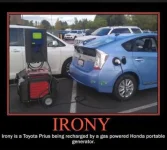Since the mid 1980s Toyota has been granted over 80,000 patents for vehicle electrification-related technologies, including 1,331 solid-state battery patents,
The solid state battery one is interesting, as nobody is producing one yet, but they definitely show promise and have interest from pretty much every major player.
and 2,753 new patents in 2021 alone.
Yes, but that's not exclusive to HEV, PHEV and EV, that's total patents, according to this article:
https://www.thedetroitbureau.com/2022/01/toyota-secures-most-patents-by-automakers-in-2021/
And the top 100 list also includes Ford, GM and Hyundai and Honda.
No other manufacturer is even close. It is almost impossible for an auto manufacturer to build a BEV or hybrid vehicle without infringing on some of these patents. In 2019 Toyota granted royalty-free licenses on 23,740 of their patents to other auto manufacturers, and an additional 5,680 patents related to its fuel cell EVs since 2015.
Interesting. So is Tesla using things Toyota has patented under this patent-fest? The FVEC point is interesting, as there appears to be little interest in this for passenger cars/trucks, so is this more related to things like busses?
If you look closely at the new Tundra Hybrid you will notice that the hybrid drive system is very similar to the BMW X5's system.
Well, I don't think it's BMW's system, I believe it's ZF's. Mazda is now using something similar. Stellantis is also going this route with the RAM and everything else using the ZF8 that BMW has been using.
It would seem that ZF certainly beat Toyota to market with this setup, as they started producing it with HEV and PHEV capability in 2018. Odd that they beat Toyota to market by 4 years if this was Toyota's development? I'm wondering if this is more the result of them just patenting everything under the sun?
https://www.zf.com/products/en/cars/stories/8speedautomatic.html
The only reason that Ford and Toyota had/have a patent sharing agreement is because Ford purchased Severinsky's 3 hybrid patents that Toyota was accused of infringing upon. Prior to that, Ford was using Toyota's hybrid patents under license. It was far cheaper to purchase Severinsky's patents and work a deal with Toyota than to pay Toyota's royalties.
According to Toyota, Ford had more than 100 unique patents on hybrid tech back in 2004 when this agreement was ratified:
https://global.toyota/en/detail/1049108
They entered into a sharing agreement related to NOx and Direct Injection apparently, which allowed Ford access to the "Synergy Drive" tech and Toyota access to Ford's DI and diesel emissions tech.
Of note, this "patent fest" appears to extend beyond Toyota (who is in the leader of patenting everything under the sun). Hyundai has filed more than 184,000 patents and Ford has the most patents on automation:
https://www.news18.com/news/auto/fo...-way-for-electric-vehicles-study-3420803.html
